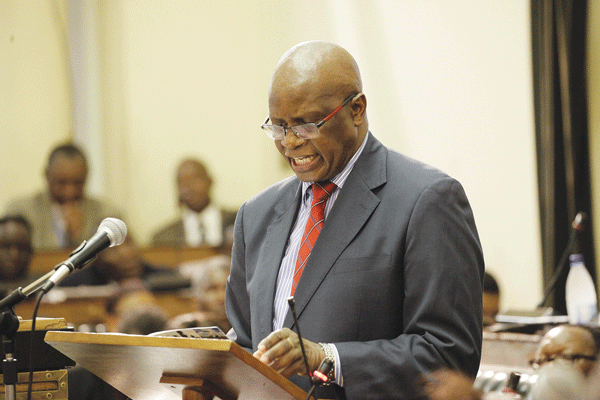
President Robert Mugabe’s government has been thrown into a fresh bond notes quandary after a citizen threatened to take Finance minister Patrick Chinamasa to court to force him to publish terms of the $200 million Afreximbank loan facility backing the surrogate currency.
By Everson Mushava
In a letter to Chinamasa dated December 19, Shepherd Mazorodze through his lawyers, Donsa-Nkomo and Mutangi Legal Practitioners, argued that his rights have been infringed by government’s refusal to disclose the terms of the agreement.
The letter, which was also copied to Reserve Bank of Zimbabwe (RBZ) governor John Mangudya and Clerk of Parliament Kennedy Chokuda, gave Chinamasa up to January 25 next year to publish the terms of the agreement or face legal action.
Donsa-Nkomo and Mutangi Legal Practitioners argued that Mazorodze’s rights to information as enshrined under section 62 of the Constitution as read with sections 149 and 300 of the same, had been violated.
“Your ministry through the RBZ issued bond notes on November 29 2016 and you told the nation that the bond notes are backed by $200 million facility concluded with Afreximbank. However, you never disclosed the terms of the said Afreximbank bank facility to the public on whom you forced the bond notes,” part of the letter by Mazorodze’s lawyers read.
“Our client is convinced that in refusing or failing to disclose the specific terms of the facility, you violated section 298(1) and (f) of the Constitution which provides that ‘there must be transparency and accountability in financial matters’ and that ‘public borrowing and all transactions involving national debt must be carried out transparently and in the best interest of Zimbabwe.”
The letter further read: “Further, your refusal or failure to disclose the details of the facility is blatant violation of section 300(30) of the Constitution which requires you ‘within 60 days after government has concluded a loan agreement or guarantee … (to) cause its terms to be published in the Gazette.”
- Chamisa under fire over US$120K donation
- Mavhunga puts DeMbare into Chibuku quarterfinals
- Pension funds bet on Cabora Bassa oilfields
- Councils defy govt fire tender directive
Keep Reading
He said Mangudya announced in May 2016 the introduction of the bond notes, but six months on, had not published the terms of the Afreximbank deal, in contravention of the Constitution.
The lawyers gave Chinamasa 30 days to publish the terms to allow the Mazorodze to petition Parliament in terms of section 149 of the Constitution in light of section 299 of the Constitution which gives the legislative house an oversight role of State Revenues and Expenditure.
“Should you refuse, fail or neglect to comply with this demand, we have firm and final instructions to institute legal action against you with without further notice,” Mazorodze said.
Government is currently working on the RBZ Amendment Bill to operationalise the use of bond notes.
Several people, including Zimbabwe People First leader Joice Mujuru, have taken the government to court over the introduction of the proxy currency, but the cash squeezed government has trudged on with the introduction of the notes aimed at easing the current cash shortage.
To date, about $29 million worth of bond notes are in circulation with the RBZ hiking the withdrawal amount to $100 bond notes a day and $300 bond notes weekly for the festive season.











